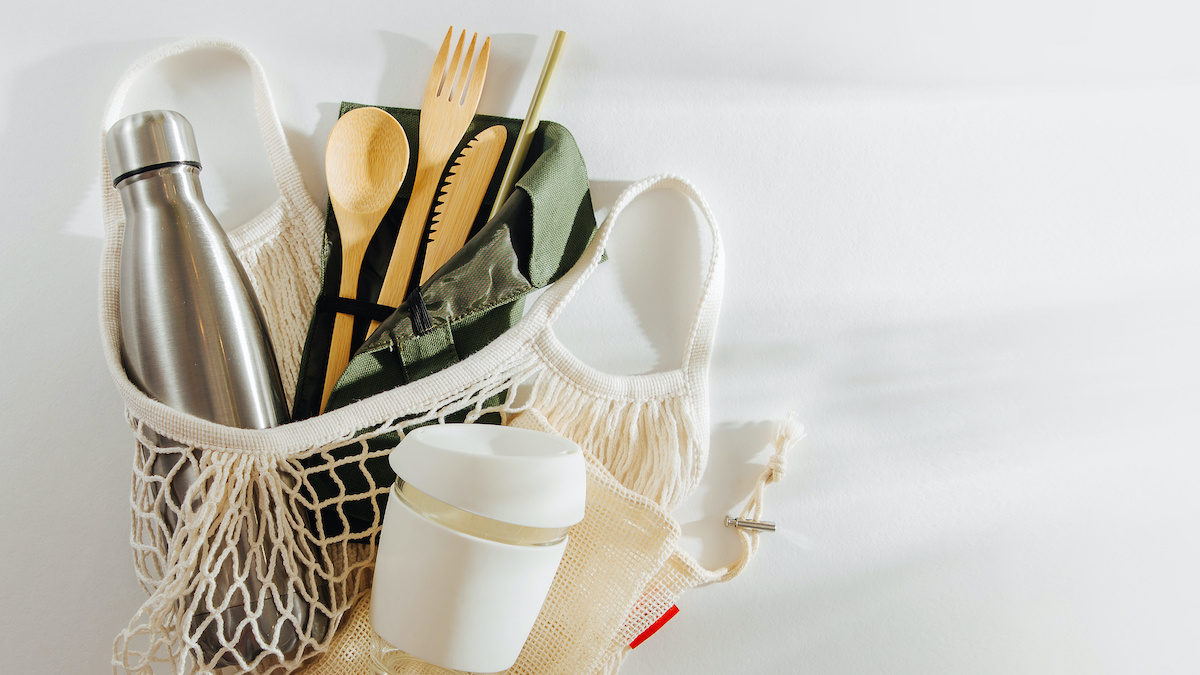
Reusable Cups, Bags and Containers Can Be Safe During COVID-19, Scientists Say

Scientists say reusable cups, bags and containers are safe to use as long as people employ basic hygiene. Igishevamaria / iStock / Getty Images Plus
The response to the global pandemic caused by the novel coronavirus has seen many states and countries reverse course on their efforts to reduce the ubiquity of single-use plastics. Now, it seems single-use plastics are a mainstay of the front lines in the fight against spreading COVID-19.
Seeing the troubling rise in plastic use and disposable items, a consortium of scientists penned a statement that was published Monday saying that reusable containers do not increase the risk of transmission, as The Independent reported. Whether or not that means states will uphold their plastic bag bans and Starbucks will allow customers to use bring-your-own cups is still unclear.
The statement was signed by 119 scientists from 18 different countries. It includes epidemiologists, virologists, biologists, chemists and doctors, who all agree that the best available science and guidance from public health professionals says reusable cups, bags and containers are perfectly safe to use as long as people employ simple and basic hygiene, according to The Guardian.
“Single-use plastic is not inherently safer than reusables, and causes additional public health concerns once it is discarded,” the statement warns, as Cambridge News in the UK reported.
Single-use plastics are on the rise as well, as more and more protective gear is used and discarded. The pandemic has ushered in a rise in the use of protective masks, gloves, face shields, overalls, dividing screens between store staff and customers, and other items, as The Times of Israel reported.
The notion of plastics as a safer alternative to reusable containers is a myth perpetuated by the plastics industry, argue campaigners for eco-conscious groups, according to The Guardian.
“It’s been shocking to witness the plastic industry take advantage of the pandemic to promote throwaway plastics and scare people away from reusable bags and other items,” said Greenpeace USA global project leader Graham Forbes, as The Times of Israel reported.
“It is crucial for businesses and governments to know that as they reopen, reusable systems can be deployed safely to protect both our environment and workers and customers,” he added. “To keep people safe and protect our planet, we should listen to the best available science instead of underhanded marketing from the plastic industry.”
Charlotte Williams, a chemistry professor at Oxford University and one of the signatories of the letter, hopes the pandemic will encourage the public to strive even further to solving plastic pollution issues.
“I hope we can come out of the COIVID-19 crisis more determined than ever to solve the pernicious problems associated with plastics in the environment,” Williams said, as The Independent reported. “In terms of the general public’s response to the COVID crisis, we should make every attempt to avoid over-consumption of single-use plastics, particularly in applications like packaging.”
According to Cambridge News, the experts suggest people wash reusable containers with hot water and detergent or soap, while also remembering to frequently wash their hands with soap and hot water or an alcohol-based hand rub, and to avoid touching their eyes, mouth or nose.
The statement went to say that retailers should follow similar practices when handling reusable containers and try to use contact-free systems for customers’ personal bags and cups whenever possible.
The scientists argue that taking care of the waste crisis is of equal importance to the COVID-19 crisis.
“Public health must include maintaining the cleanliness of our home, the Earth,” said Dr. Mark Miller, former director of research at the U.S. National Institutes of Health’s Fogarty International Center to The Times of Israel. “The promotion of unnecessary single-use plastics to decrease exposure to the coronavirus negatively impacts the environment, water systems, and potential food supply compared to the safe use of reusable bags, containers and utensils.”
- Here's How to Clean Your Groceries During the COVID-19 Outbreak ...
- Plastic Bag Bans Put on Hold Amid Coronavirus Fears - EcoWatch
- Coronavirus: Can we still live sustainably? - EcoWatch
- Plastic Packaging Use Increases During the Coronavirus - EcoWatch
- Starbucks to Require All U.S. Customers to Mask Up - EcoWatch
- Why Face Masks Belong At Your Thanksgiving Gathering + 7 Things You Need to Know About Wearing Them - EcoWatch
- Starbucks Pilots Reusable Cups in Seattle, But Does the New Program Go Far Enough?

 233k
233k  41k
41k  Subscribe
Subscribe 